Services
Helping You Maintain Complete Dental And Oral Health
From simple dental procedures to complex treatments and surgeries, we make it possible to achieve optimum dental and oral health for people of all ages. With our modern approach to dentistry and the use of the best industry practices, we are able to make treatment outcomes more positive, without compromising patient comfort.
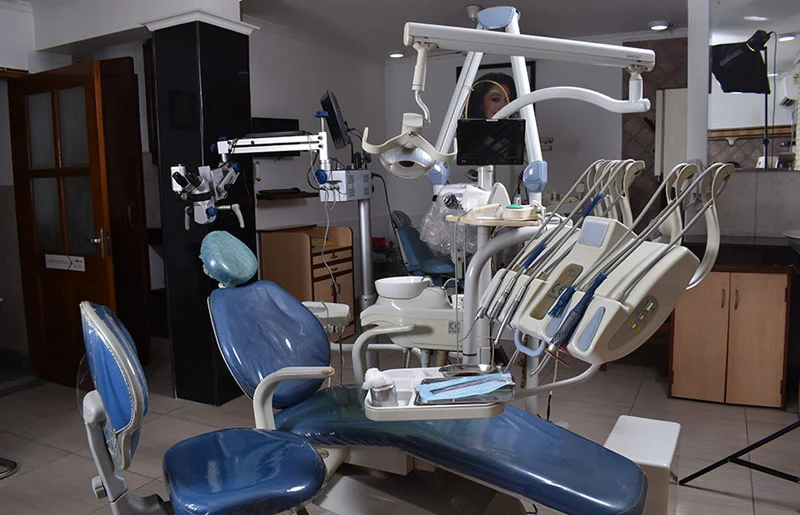
Serving The Community
With A Smile
At Kamal Dental Clinic, you’ll discover that high-quality dental care is not only effective, but it is also gentle, comfortable, and affordable! Delhiites put their trust in our reputed dentists for their ability to build trust and transparency in every doctor-patient relationship. Our advanced dental clinics are located in Greater Kailash and Munirka where we are always ready to help you with all your family’s dental needs.
Our Range Of Dental Procedures
- Root Canal Treatment
- Invisalign®
- Oral Prophylaxis / Scaling
- Fillings And Restoration
- Tooth Impaction
- Orthodontic Treatment
- Dental Implants
- Dentures
- Crown And Bridge / Fixed Partial Dentures
- Smile Designing
- Full Mouth Rehabilitation
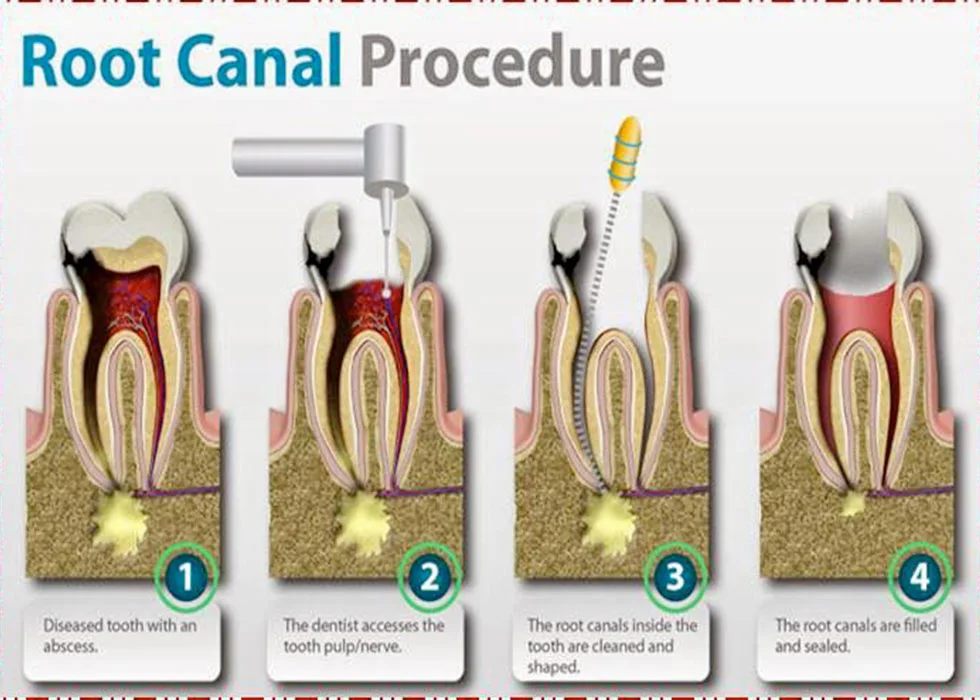
Root canal therapy, also known as endodontic therapy, is a dental treatment performed to remove an infection from inside a tooth. The treatment is also helpful in protecting the teeth from future infections. In order to save the tooth from decay, the procedure involves removing the pulp (living tissues inside the tooth) along with nerves and bacteria. This relieves dental pain and saves the natural tooth.
Modern techniques and technology have led to the evolution of this dental procedure into a relatively comfortable treatment that requires no more than one or two trips to the dentist. The modern-day root canal treatment is performed under a microscope to ensure precision in every step of the procedure. Our dentists administer anesthesia to numb the tooth and then clear away the damaged and diseased pulp with small drills and files. Once the chamber has been thoroughly cleaned and dried, the canals are filled with specially medicated dental materials that help restore the tooth to its full function.
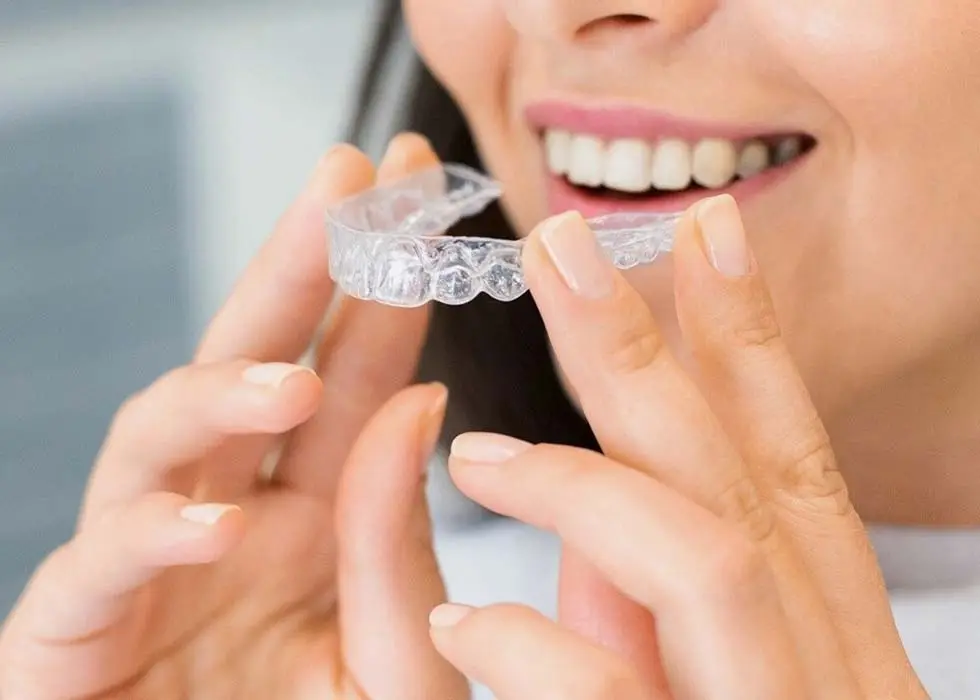
If you feel embarrassed about wearing your traditional metal braces and need to fix your crooked teeth without any ill effect on your social life, Invisalign® is the right option for you. Invisalign® are clear aligners that are used to straighten teeth, close gaps, and treat orthodontic issues like underbite, overbite, crossbite, and more. Compared to regular braces, they not only deliver quick results but are also believed to reduce the chances of ulcers by 47%.
At Kamal Dental Clinic, we offer Invisalign® to help you achieve a beautiful smile. If you have any questions about the treatment, please feel free to share them with us.
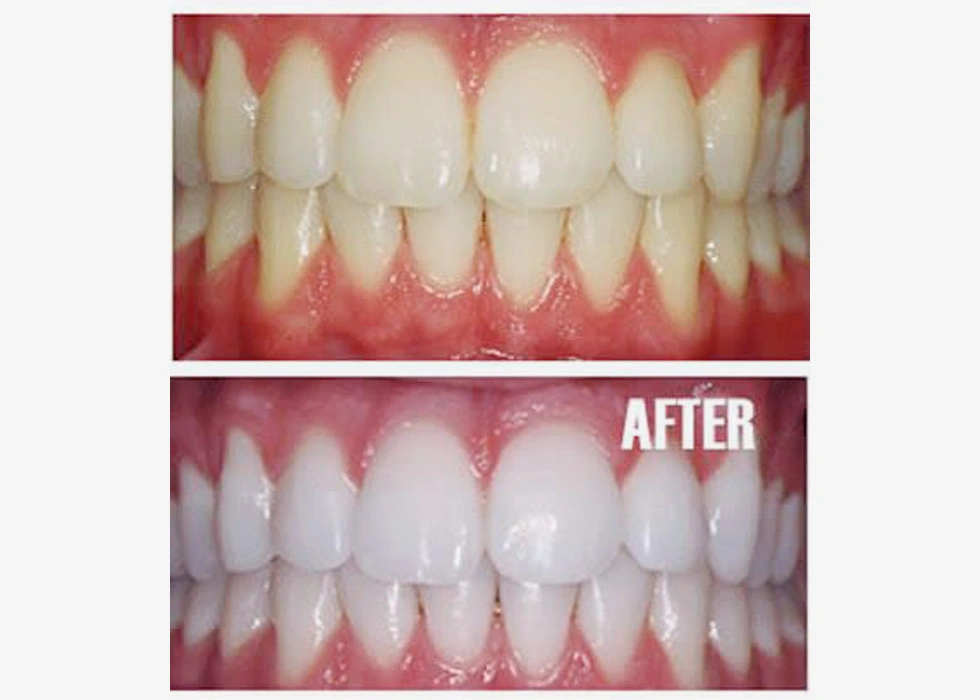
Oral prophylaxis is primarily a teeth cleaning procedure which involves the removal of tartar and plaque deposits from the surface of the teeth. The hidden surface areas between the teeth and under the gums are also cleaned properly. An ultrasonic scaler, a specialised device, is used to remove the deposits.
An initial inspection is performed to identify the scope of cleaning required. When only the visible surfaces of your teeth have deposits, regular cleaning or scaling is performed. However, deep cleaning or deep scaling is required if there is a buildup of tartar and plaque within the gums also. Oral prophylaxis is an effective preventive measure that helps fight and control gum diseases and tooth decay. The frequency of a person’s gum maintenance appointments depends on their oral health condition, which will be determined through an initial diagnosis by our dentists.
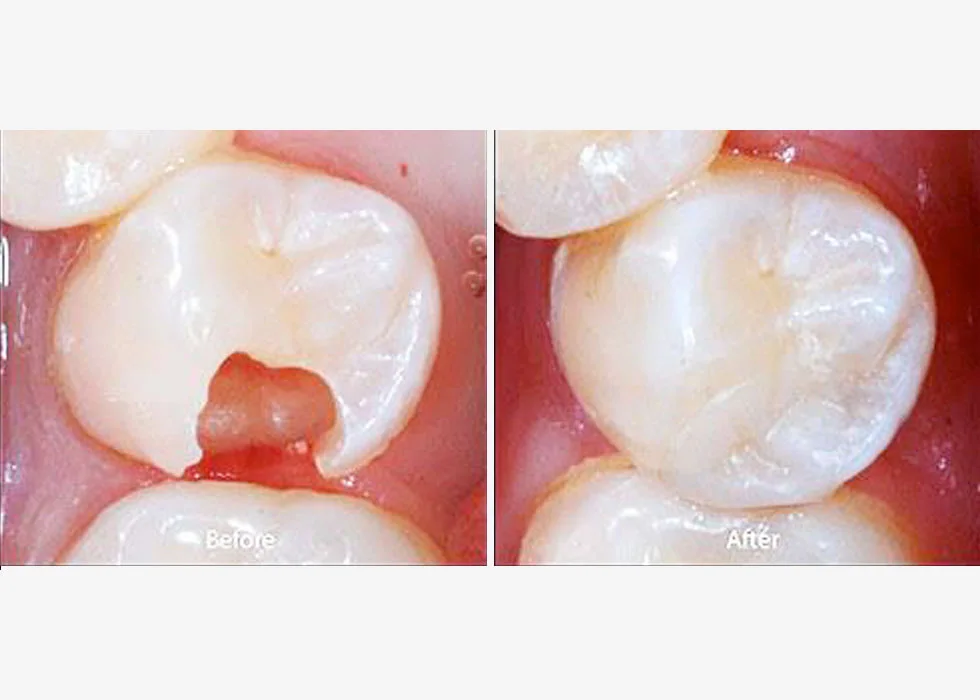
Cosmetic fillings and restoration are done to restore decayed or damaged teeth. The process involves removing the decayed tooth material, after which the affected area is cleaned and sterilised. Once the filling material has been placed into the cavity, it is closed to ensure that bacteria can’t enter the spaces again. This helps prevent further tooth damage and decay. The common materials used for fillings include gold, porcelain, composite resin, and amalgam.
Gold – Gold filling is quite expensive and requires multiple visits to the dentist. Gold filling is custom-made in a dental laboratory before being cemented into place. Gold inlays are highly durable, can withstand pressure while chewing, and are well-accepted by gum tissue.
Amalgam – The fastest and least costly choice of filling, amalgam is structured to be resistant to everyday wear and tear. Since this material is more noticeable than porcelain or composite, it is not usually used in visible areas.
Ionomers – Ionomers are tooth coloured materials that dentists often use for small cavities. Ionomers release a small amount of fluoride, which helps in the prevention of further tooth decay.
Composite Resins – Also known as tooth-coloured composite fillings, composite resins can be designed to match the colour of your teeth, leading to a natural appearance. Composite resins provide durability and are resistant to fracture in case of small to medium-sized fillings. They are suitable for both front and back teeth.
Porcelain – Porcelain fillings are called inlays or onlays, and are produced according to individual specifications in a dental lab. They are then bonded to the affected tooth. They can be custom-designed to match the colour of your real teeth and are resistant to staining, which ensures that you will enjoy a beautiful smile for a long time.
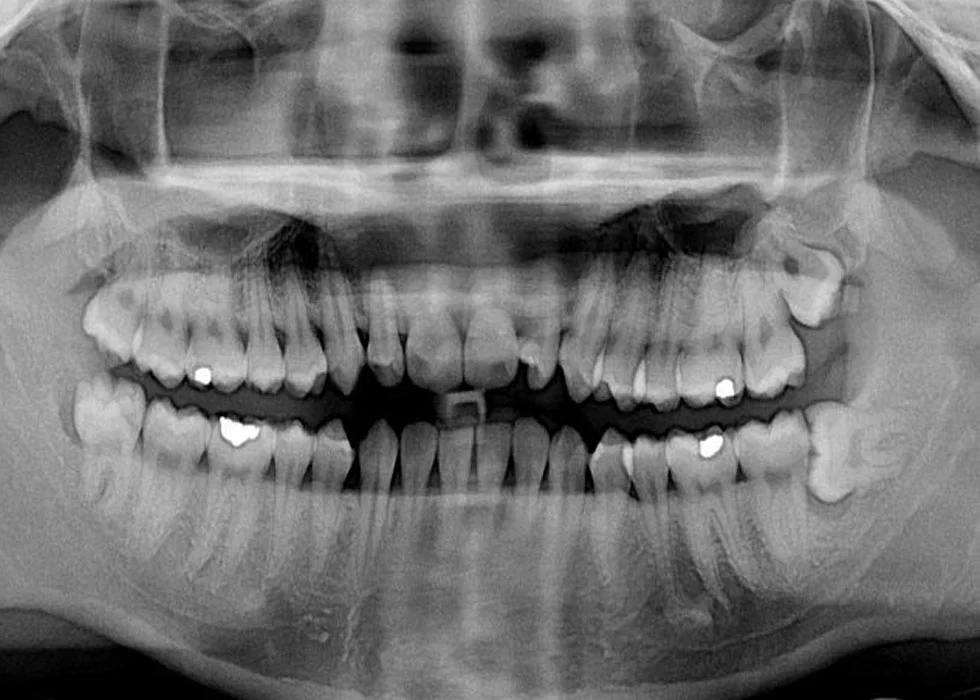
The third molars or wisdom teeth and even canine or other teeth can get impacted or fail to emerge properly, often due to lack of space. Sometimes, a tooth may be partially impacted, meaning it has started to break through the gums, but it is yet to grow to its full shape. Oftentimes, impacted teeth may not result in any obvious symptoms and are only discovered during a routine x-ray at the dentist’s office. However, in some cases, people may notice symptoms of an impacted tooth such as jaw pain, swelling or bleeding, damage to other teeth, and bad breath. Wisdom teeth are more likely to get affected since they are the last ones to emerge and, by this time, the jaw has stopped growing.
If you sense that your tooth has been impacted, but it isn’t causing any symptoms, it is suggested that you should monitor its growth regularly instead of getting it removed immediately. On the other hand if you experience problems or any noticeable side-effects, the first approach of our dentists is to administer eruption aids that encourage the impacted teeth to develop properly and fully. If normal eruption is not achieved, extraction surgery is performed to remove the impacted tooth.
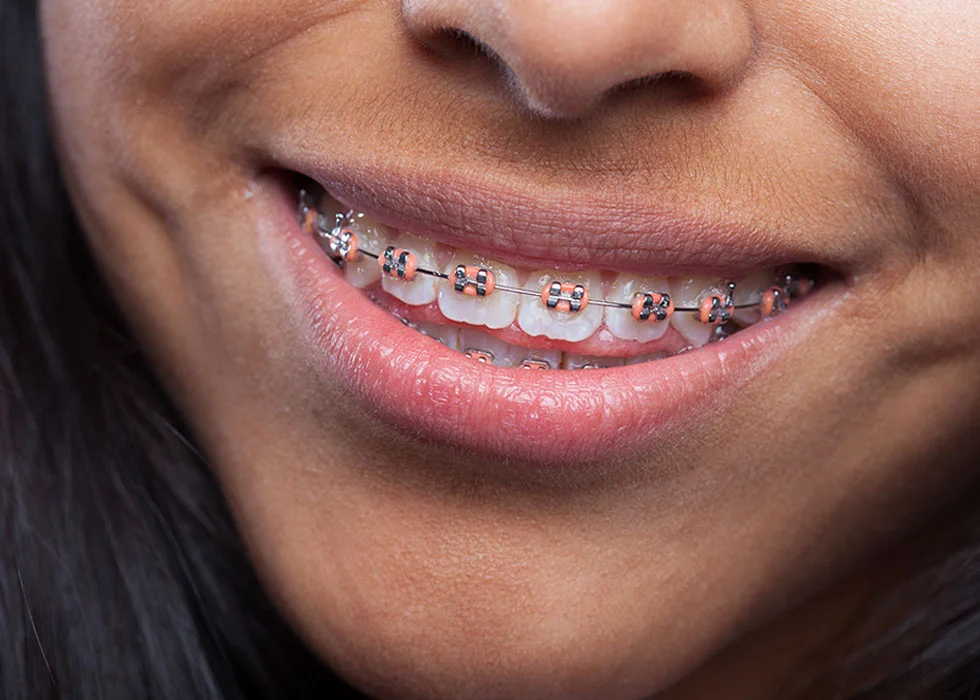
Our orthodontic interventions can help people with irregularly aligned teeth. The problem is treated or corrected with the use of braces or, in some cases, through surgery. Although childhood is the best time to get your smile corrected, adults can also have orthodontic treatment done! Orthodontic treatment can be done with many kinds of appliances, which are commonly known as ‘braces’.
Fixed Brace – In a fixed brace, the brackets (usually of metal or ceramic) and bands are temporarily stuck to the teeth. A flexible wire joins all the brackets and transmits a force onto the teeth, which causes them to move gradually to close the spaces.
Removable Brace – Removable braces are mainly suggested after you have completed the treatment with a fixed brace. The procedure involves attaching delicate wires and springs across the teeth. These wires put slight pressure and move the teeth to close gaps. The plate used in a removable brace is easy to take out to clean. Hence, maintaining oral hygiene is fairly easy and convenient with removable braces.
Functional Brace – When there is a need to alter or improve the way the jaw grows, functional braces are used. They work by using the power of your jaw muscles and can even help improve various jaw problems.
Invisible Brace – If you don’t want to wear hideous-looking braces, invisible braces are for you! They are tough, clean plastic aligners (or moulds) which are used to straighten teeth. Several sets of specially moulded, slightly different aligners are made for each patient. They can be easily removed for eating, drinking and brushing.
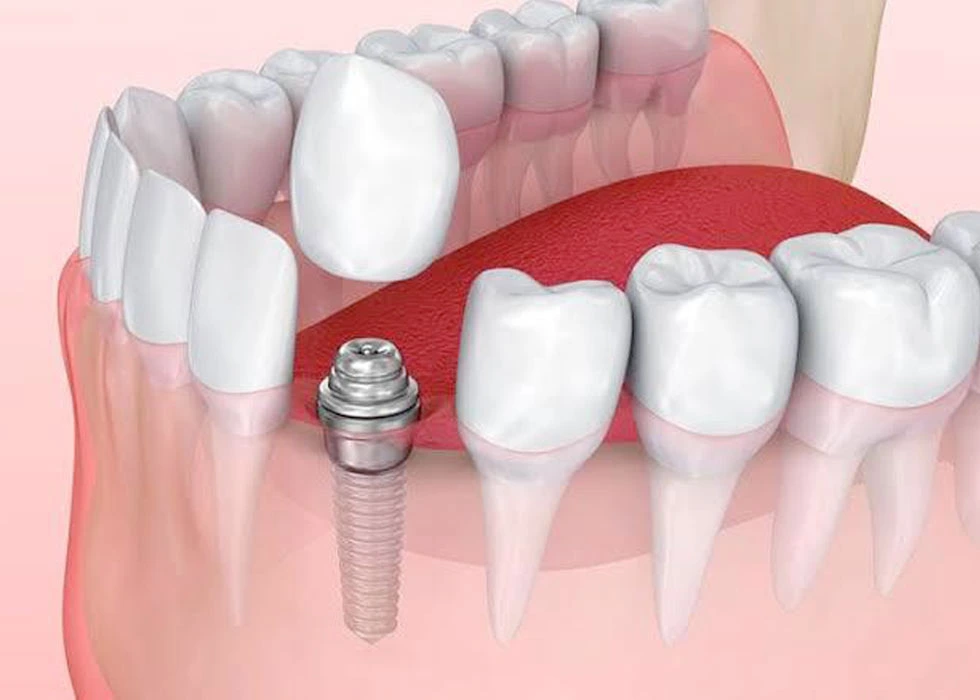
Dental implants involve placing a surgical fixture into the jaw bone and allowing it to fuse with the bone over a few months. Gradually, this becomes a sturdy base for supporting artificial teeth. The implant allows these new teeth to look, feel and function naturally. Most dental implants are made of titanium, which allows them to integrate with the bone without being recognised as a foreign object in our body. Today the success rate for dental implants is close to 98%.
Dental implants can be used to replace a single tooth, several teeth or all the teeth. The goal of teeth replacement is to restore functions as well as aesthetics. Dental implants can help patients who have lost their teeth (of the upper or lower arch) due to decay or gum diseases. Using a minimal number of implants, our dentists can provide a very stable and comfortable prosthesis.
One of the many effective treatment options is ‘All on 4’. It means four implants can be used to replace all the teeth in a single arch and then a thin denture prosthesis is screwed into place. Implant dentistry has allowed for more treatment options to replace single and multiple missing teeth with long term stability. This has significantly contributed to improved oral health in people with dental implants.
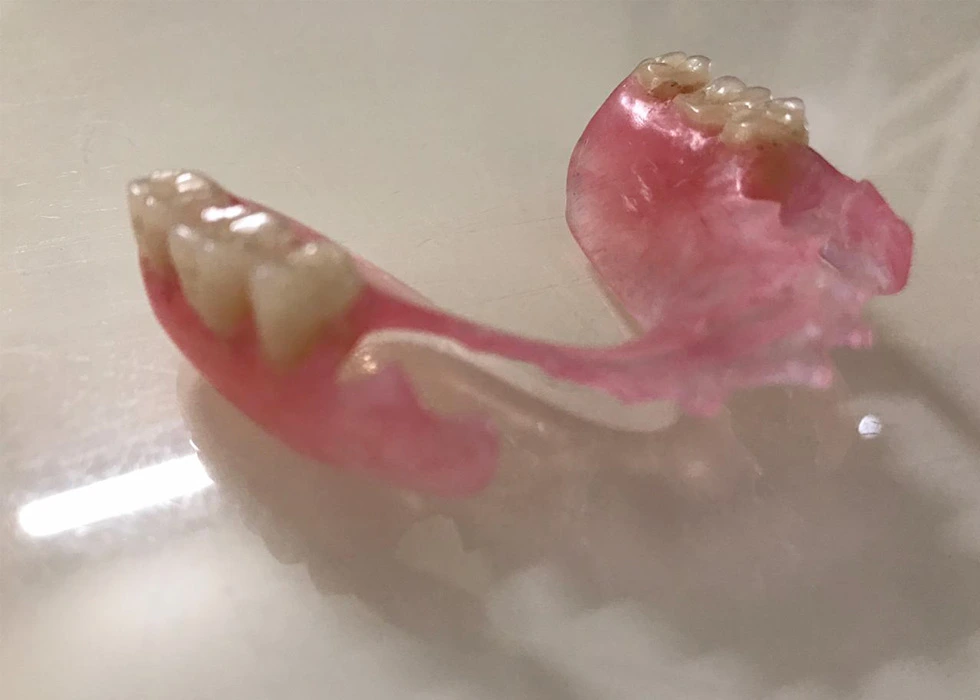
Dentures are artificial teeth which replace the original ones and help restore your smile. They are the replacements of missing teeth that can be taken out and put back into your mouth. Dentures are supported by soft and hard tissues that surround the teeth and bone of the oral cavity. The supporting structures of dentures are designed to hold the artificial teeth in place and to resemble the natural gum line. These structures are often made out of resin or a more flexible polymer material that fits perfectly on the natural gum line.
Our dentures are custom-designed to not only improve the appearance of your smile, but also provide structural support to the cheeks and lips. Dentures can withstand heavy chewing force, allowing you to enjoy dishes that require strong chewing and maintain the same diet even after getting dentures. Our dentures are strong, durable, and custom-fitted to give a natural-looking smile!
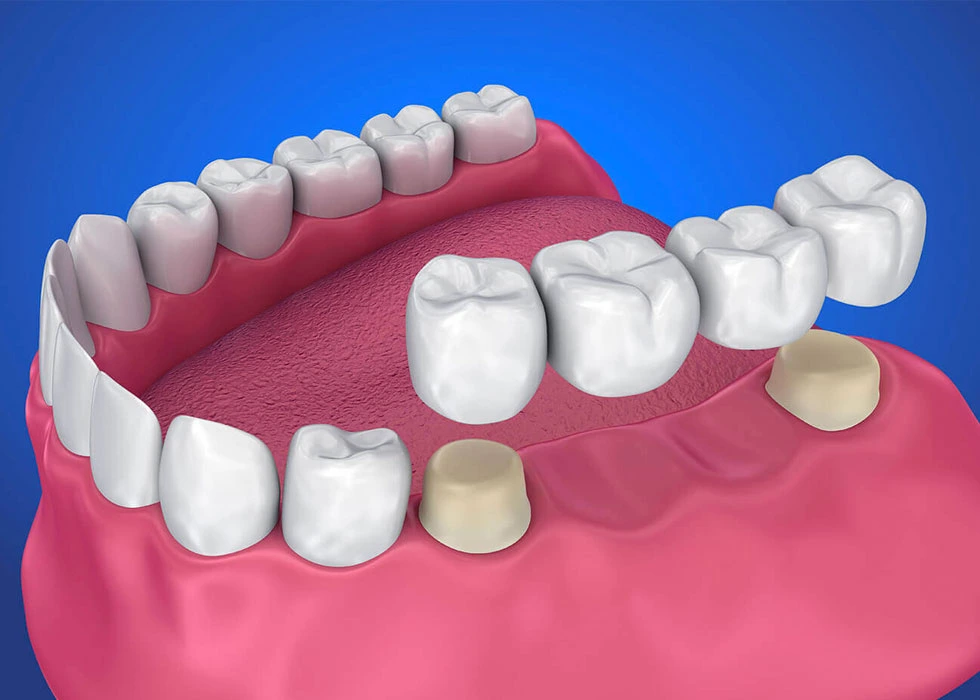
Fixed partial dentures are a dental restoration option which replace missing teeth. Fixed artificial teeth are used to fill the gaps made by missing teeth. They can be either crowns or bridges. A crown is a single unit of a fixed artificial tooth, whereas a bridge is composed of two or more units and can replace more than one missing tooth. These are dental prostheses which are attached to the adjacent teeth, the roots, or dental implant abutments. Crowns can be used to improve tooth appearance, shape or alignment. Crowns are recommended to:
- Replace a large filling when there isn’t enough tooth remaining.
- Protect a weak tooth from fracturing.
- Attach a bridge.
- Cover a dental implant.
- Cover a discoloured or poorly shaped tooth.
- Cover a tooth that has had RCT.
Crowns can be made of various materials. Porcelain or ceramic crowns are the preferred choices when the appearance of the artificial tooth needs to be matched with that of your natural teeth. Other popular material choices for a crown include gold and metal alloys, as well as acrylic.
Bridges are recommended if one or more teeth are missing. Gaps left by missing teeth eventually cause the remaining natural teeth to rotate or shift towards the nearby empty spaces, resulting in a bad bite and other dental problems. This imbalance caused by missing teeth can also lead to gum diseases and Temporomandibular Joint or TMJ disorder.

Your smile is an expression of happiness and a part of your personality. If you are suffering from dental problems such as a weak tooth, tooth decay, stains, or bacterial plaque, smile designing is the best option for you. It is a cosmetic treatment that focuses on improving the appearance of your smile through certain procedures such as dental veneers, composite bonding, teeth whitening and tooth implants.
Some factors taken into consideration for smile designing include facial appearance, skin tone, gum tissues and lips. Smile designing not only helps in high-quality restoration of your dental health but also gives your lips a fuller and thicker look.
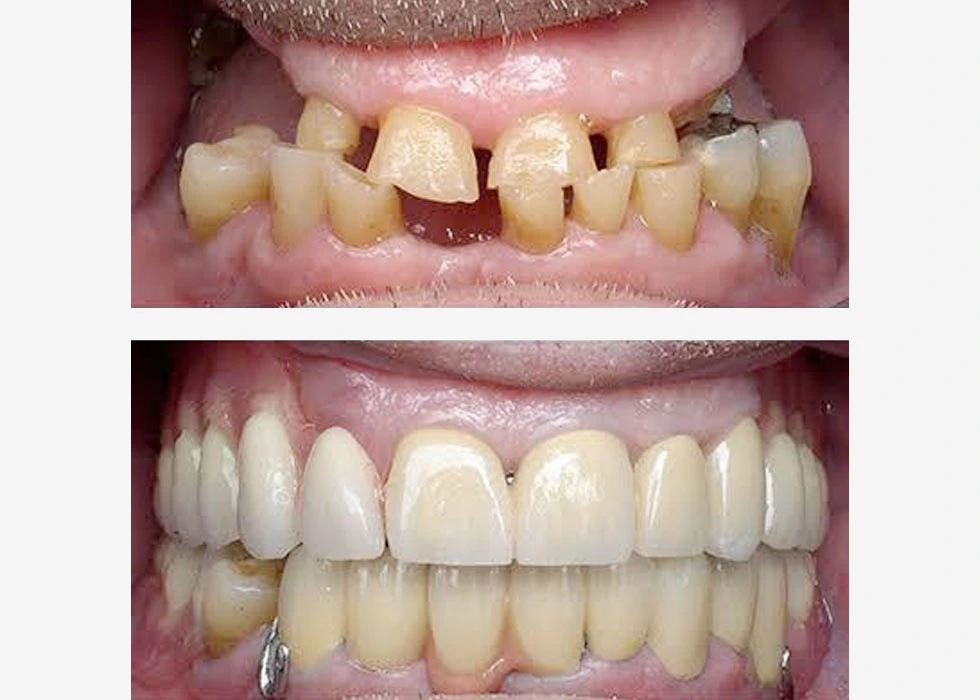
Full mouth rehabilitation treatment refers to rebuilding or replacing all of the teeth in a patient’s mouth. The treatment works to improve both the function and aesthetics of your teeth and smile. As a highly individualised treatment, the focus is also on improving the overall health of the mouth, including gums, teeth, and bite.
Full mouth rehabilitation is often recommended for patients that have multiple missing teeth or numerous teeth with large fillings which are failing or exhibiting decay. The treatment can also help people with cracked, broken, or badly worn-out teeth due to an accident or teeth grinding habits. The treatment can involve a combination of onlays, crowns, bridges, veneers, dental implants or dentures that provide not only a smile makeover, but also improved chewing efficiency to patients.
